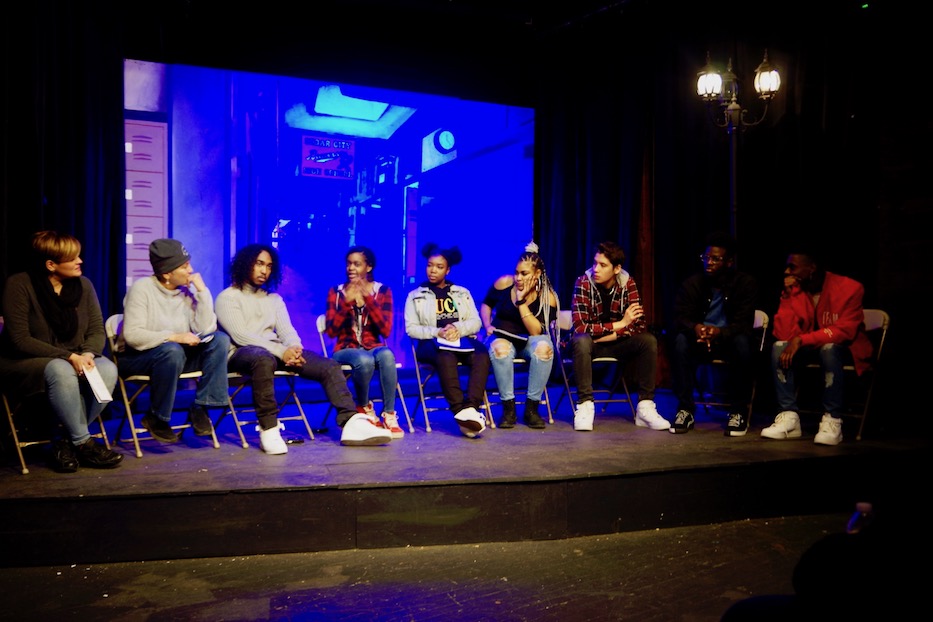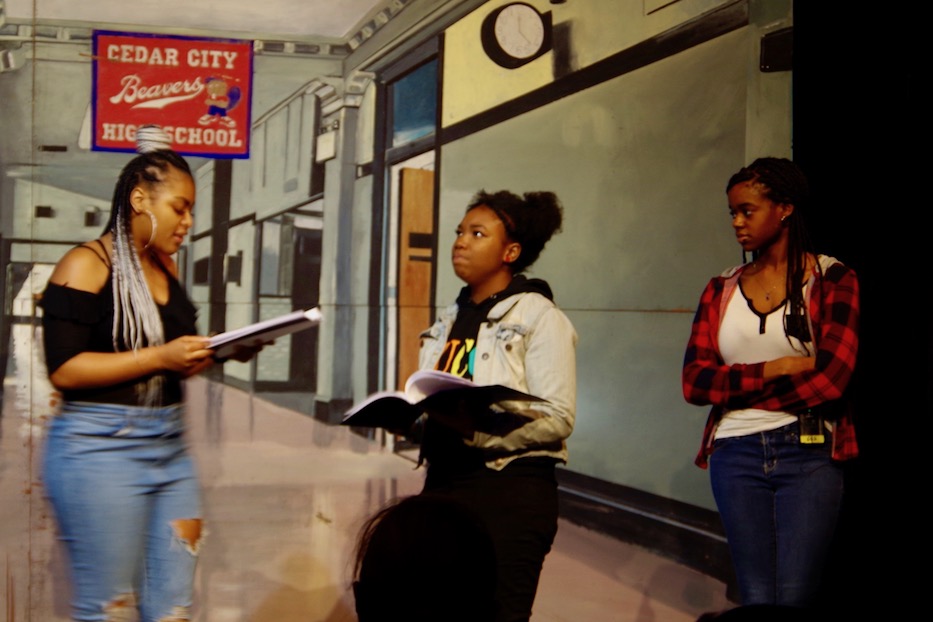

| The cast during a talkback. Jamiah Green Photos. |
Lights go up at the center of the stage. Emily and Derrick stand in a school hallway, chatting about their algebra homework. Derrick walks away just as Emily’s boyfriend Jason approaches. Jason glowers and accuses her of flirting with Derrick. Accusations fly: soon Emily has been slapped across the face and Jason has fled the scene.
This is the opening scene from There’s No Excuse For Dating Abuse, a short play directed by Janis Astor del Valle and initially created by the Hazelden Foundation and Connecticut Coalition Against Domestic Violence (CCADV). Saturday, the play came to Bregamos Community Theater to commemorate Teen Dating Violence Awareness Month. All roles were played by local high school students, in an attempt to bring the issue to life in the most realistic way possible.
There’s No Excuse For Dating Abuse follows Emily (Cooperative Arts & Humanities High School Junior Keona-Marie Gomes) and Jason (Cooperative Arts & Humanities High School Junior Juwan Lee), a teenage couple caught in the crosshairs of dating abuse after jealousy and misunderstanding escalate into physical violence.
In the play, the trouble begins when Emily begins to tutor Derrick (Hamden High Junior Elias Natal), causing Jason to become jealous and suspicious of his girlfriend. As the work unfolds, the two fall into a cycle of physical violence, in which Jason hits Emily, apologizes for his actions, buys Emily gifts, and then grows distrustful and aggressive yet again.
The play hits home. One in three teens report that they have been physically, sexually, or emotionally abused by their partner, according to JAMA (Journal of the American Medical Association) Pediatrics. For del Valle and her collaborators, that’s far too many.

On stage at Bregamos, student actors highlighted the importance of one’s friends in intervening. After seeing marks on Emily’s face in the school bathroom, her friends Carissa (Cooperative Arts & Humanities High School Junior Janiya Woods) and Elizabeth (James Hillhouse High School Junior Cat Wicks) try to get to the truth of what is happening to their friend, ultimately providing her the support she needs.
Noticing Jason’s out-of-control behavior and physical altercation with Derrick in the gym, friends Kevin (James Hillhouse High School Junior Marquise Nichols) and Phil (Cooperative Arts & Humanities High School Junior Donte Warren) help Jason acknowledge the violence in his behavior. They give him strategies on how to ease his anger without hurting anyone, then talk to him about things that are going on at home and in his life.
“How do we as friends help the person?” Woods said at the audience talkback on Saturday.
Del Valle, cast members, and CCADV Safe Connect Advocacy Coordinator Maritza Rosa spoke at length about what can cause people to become abusers. They also gave information on how both victims of the abuse or and abusers themselves can receive help.
“Be a good listener and be there for that person,” said Rosa. “It’s going to take them a long time to finally say, ‘I’m done.’ Try to walk them through that process.”
She added that there is often stigma—both real and perceived—when victims of dating abuse reach out for help.
“A lot of people don’t know where to go and a lot of people are embarrassed,” she said. “They have the question in their minds that’s like, ‘How can I let people know that I am a victim of abuse?’”
Several of the student-actors also suggested that abuse can come in many forms, and from many places. Wicks suggested that what a student sees and experienced in their own home may translate to their relationships with their friends and romantic partners.
“I feel like discipline causes abuse,” Wicks said during the discussion. “You think you’re disciplining your child, but really, you’re hitting them for no reason. I don’t think it’s necessary to beat a child at all… as kids and as humans, we are able to communicate.”
Nichols noted that abuse can also be verbal. Echoing several of his peers, he pointed out that kids who grow up in an environment where there is physical or verbal violence are more likely to be victims, and sometimes perpetrators, of that violence themselves.
For more information about SafeConnect, click here. To look out for upcoming events happening at the Bregamos Community Theater, click here.

